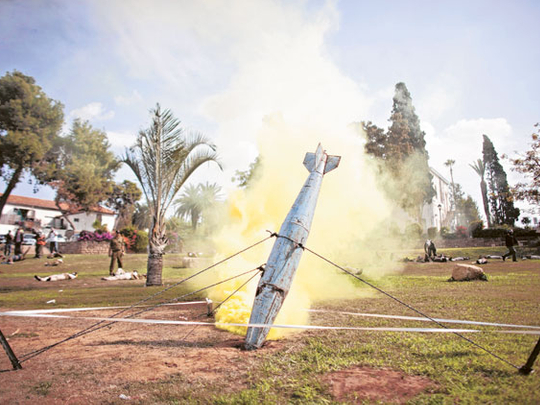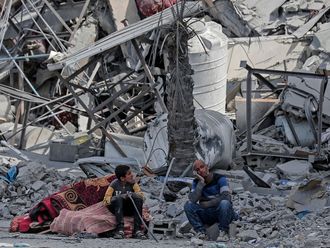
Will Iran bomb Israel into rubble, like Hiroshima and Nagasaki, if the Tehran regime is someday armed with nuclear weapons? No one of my acquaintances believes that will ever happen, nor do thoughtful Israelis. But many people believe Israel will soon use conventional bombs to disable Iranian nuclear research facilities. All of us should ponder why.
Bombing Iran is high risk. It will likely mean widening war, not just a skirmish. It will convince any Iranian doubters their country really needs nuclear weapon protection. Skilful bombing will delay any Iranian bomb construction for several years, but a determined Iranian government will eventually possess a warhead, even if it comes from the black market.
Iran is a large, proud, well-educated, resourceful and well-armed nation, not a pipsqueak bunch of thugs. Although Israel has survived by the sword since its founding, thanks mainly to US subservience, trying to immobilise Iran is a mammoth undertaking.
Iran's main complaint against Israel is its brutal on-going colonisation of mostly-Muslim Palestine, a rebuke applauded by all Muslims and most other people worldwide. Iran takes a major role supporting resistance to Israeli aggression. Israel could of course end this conflict without firing a single shot by first withdrawing from illegally held Palestinian land.
Israel's immediate goal is to make the US its partner in a planned conventional assault on Iran. To that end, Israel's US lobby is trying to convince the American people Iran is a bad actor and a sinister force in the raging Syrian civil war. Israel has such mastery of US media this goal may be easily achieved.
Key military doctrine
US President Barack Obama keeps the war option alive and recently sent Israel a supply of America's latest deep penetration bombs, a certain and ominous sign of US complicity if assault occurs.
My acquaintance with nuclear bombs began long ago. As a Seabee (member of US Navy construction battalion) I walked through the awful devastation at Nagasaki shortly after US nuclear bombing there ended Second World War. It was a chilling experience. Years later in Congress, I heard an expert witness predict more than 20 nations had the wherewithal to build a nuclear warhead in a few weeks.
Fortunately, although nuclear armaments have proliferated, none has been fired in anger since Nagasaki. This is mainly because a little-noted military doctrine sends a powerful message: when disputing governments both possess nuclear weapons, neither will commit acts of war against the other. It is called Mutual Assured Destruction (MAD). It created a standoff between the US and the Soviet Union, both armed with nukes. It kept the Cold War from getting hot.
Former president Dwight D. Eisenhower alluded to this doctrine in l964 during a private discussion I had with him in his Gettysburg office. He said, "One way to keep European nations from fighting each other would be to supply an atomic [nuclear] warhead to each head of government." He was not joking. His point: nuclear weapons have only one military value, but it is an important one — to deter attack.
Nukes now provide deterrence from attack only to the nations possessing nuclear warheads or those given special treaty protection by nations possessing these weapons. Until an international institution strong enough to enforce a worldwide ban on nuclear warheads comes into being, all threatened nations will be tempted to build their own nuclear bomb deterrence. Except for Pakistan, all Muslim countries lack such deterrence. If Iran possessed even one nuclear warhead, Israel would not be beating drums for assault of the Tehran regime.
Iran finds little sympathy among Americans these days. Most of them never heard of MAD, but they remember with anger Iran's illegal imprisonment of US diplomats in the American embassy in Tehran throughout the last 440 days of the Carter administration.
Few American citizens remember the illegal, bloody 1953 US-British military coup that ousted Iran's democratically-elected government headed by Mohammad Mossadegh. Coup forces imprisoned the ousted leader for life, installed the Shah as absolute dictator, and restored British-US exploitation of Iranian oil reserves.
It was the worst chapter of the Eisenhower administration. Iranians also remember US support for Iraq in the war that dictator Saddam Hussain initiated against Tehran in the 1980s. The Iranian death toll exceeded a half-million.
If Iran gets a nuke or two, it will have deterrence against attack from any hostile power, including Israel. Another peaceful standoff would exist. Gideon Rose, editor of Foreign Affairs, says, "…deterrence is less disastrous than preventive war."
Will Obama lead America into a war whose only goal is to deny Iran deterrence from attack? All parties, especially Obama and the Republicans campaigning to succeed him, should cease war talk. Parts of the region are already rife with high tension, threats, and hate. It is so full of competing military vessels they may literally bump us all into an unintended but horrific conflict that could engulf much of the world.
Paul Findley is the author of six books, the latest is Speaking Out. He served 22 years as a Republican Representative in the US House of Representatives.










